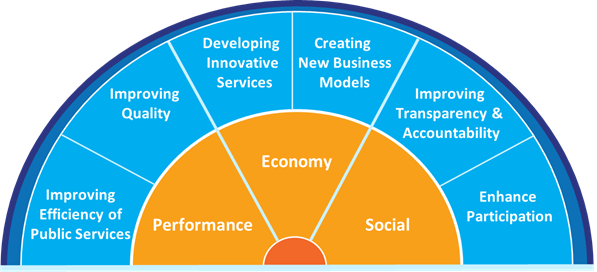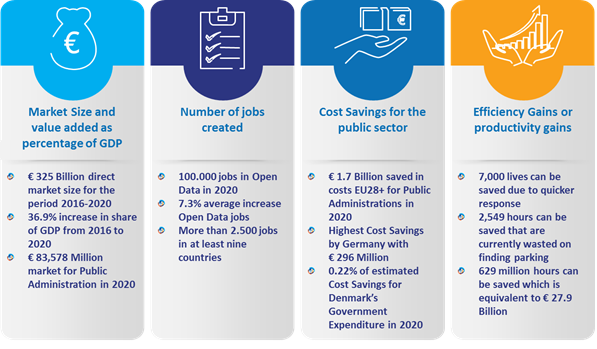The economic benefits of Open Data
The Open Data impact at macro and microeconomic levels - an overview of studies and assessments conducted across Europe
Europe is making considerable progress in reaching Open Data maturity and is fast-forwarding its Open Data transformation. Recent studies show that higher economic benefits are expected from Open Data at both macroeconomic and microeconomic levels.
Data holds a tremendous potential for societies and economies. When disclosed, data can stimulate economic growth, better decision-making, more transparency and efficiency of governments, as well as higher quality of life and more inclusive societies. Numerous studies undertaken across Europe and the globe have measured the impact of data for economic, political and societal development, with several others pinpointing the importance of Open Data for economic growth. Open Data is seen as a driver for economic growth and an enabler for transparency and accountability, as well as innovation and knowledge.
The recently published Report on the Economic Benefits of Open Data looks at the evidence available so far and provides a comprehensive compilation of the various assessments and studies that have been conducted across Europe in the past years. By doing so, it contributes to the existing literature that discusses the economic potential of Open Data.
The report quotes the various studies that have been conducted and/or commissioned to assess the potential that Open Data holds for governments, economies, and societies as a whole. Several of these studies focus on the macroeconomic and microeconomic impact of Open Data across Europe and quantify this economic potential. The assessments provide a series of scenarios estimating the economic impact of Open Data at national, European and global level with predictions that range from conservative to very ambitious. Despite the method applied by the studies and the estimates they provide, all studies agree that data can become a source of growth and development for economy, society and the government.

The present report sheds light on the economic benefits and dives deeper into the impact of Open Data at both macroeconomic and microeconomic levels. In doing so, it breaks down the broader concept of 'data' into Open (Government) Data and privately held data that is of public interest. Privately held data of public interest constitutes another pillar in the EU data economy. When released and potentially combined with Open Data, it can be an important driver of economic, societal and environmental benefits and will most certainly play an important role in helping Europe maintain its competitiveness in the international arena. The estimates made in the context of the EU vision of building a European data economy underline the potential that a free flow of data holds for economic growth across Europe. With the value of the EU data economy expected to grow up to EUR 739 billion by 2020 (4% of the EU GDP) presented by the European Data Market Study in May 2017, this potential is again underlined.
Overall, the following benefits and estimated numbers were identified when available data is published:

The report also provides insights into the costs of opening up data as well as into how to ensure the sustainability of data publication and data infrastructures. It also zooms into the benefits that incur to the public sector, identified by the Creating Value from Open Data Study as the main user of its own data. Further studies conducted by the European Data Portal, such as the 2017 report on the Open Data Maturity across Europe illustrate the current progress in terms of Open Data impact on the societal, political and economic dimensions. The report offers a series of examples of Open Data based applications and services that have been developed across Europe and emphasises the economic potential that Open Data has.
In the light of the findings, the current analytical report concludes with a call for action for further evidence to be gathered, at both EU and country level. More facts and figures can in turn rally further support around Open Data.
Do you want to find out what the economic potential of Open Data at the EU and country level is and what studies have assessed Open Data's potential? Then check out the full analytical report here!
